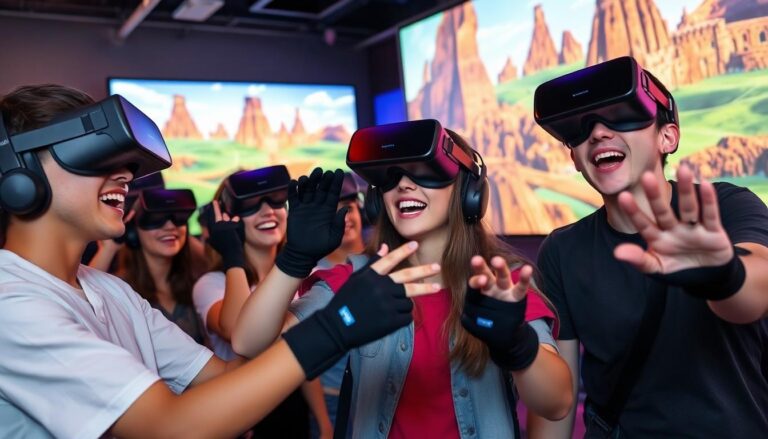Table of Contents
ToggleIn the heart of Pittsburgh, a digital revolution is taking place, and it’s more exciting than a Steelers game on a Sunday afternoon. Virtual reality is no longer just a sci-fi dream; it’s a thrilling reality that’s transforming how locals experience entertainment, education, and even therapy. Imagine stepping into a world where you can battle dragons, explore distant galaxies, or even take a stroll through a virtual version of the Steel City—all without leaving your couch.
Overview of Virtual Reality in Pittsburgh
Virtual reality in Pittsburgh is experiencing rapid growth, with significant applications across multiple sectors. The entertainment industry has embraced immersive gaming experiences, offering players opportunities to engage in thrilling adventures and explore detailed virtual environments. Numerous local gaming studios contribute to this expanding landscape, creating diverse VR offerings.
Education also benefits from advancements in virtual reality technologies. Schools and universities in Pittsburgh are integrating VR into their curricula to enhance learning. Students explore historical events or scientific concepts in interactive ways, making education more engaging and effective.
Health sectors in Pittsburgh leverage virtual reality for innovative therapy solutions. VR is used in treating PTSD, phobias, and anxiety disorders, providing safe environments for patients to confront fears and manage stress. Medical professionals collaborate with tech companies to develop tailored VR programs aimed at improving mental health outcomes.
Establishments like VR arcades have emerged, providing public access to these immersive experiences. Visitors can partake in a variety of VR activities, from social games to educational simulations. Such venues foster social interaction and community engagement.
Local meetups and events dedicated to virtual reality bring enthusiasts together, sharing knowledge and experiences. These gatherings promote collaboration among developers, artists, and users, further fueling innovation in the field.
Investment in virtual reality startups is on the rise, attracting attention from venture capital firms. This financial support enhances the potential for groundbreaking advancements, pushing Pittsburgh to the forefront of the VR revolution. As technologies continue to evolve, virtual reality’s impact on the city remains significant and transformative.
Key Players in the Pittsburgh VR Scene

Pittsburgh’s virtual reality scene comprises various key players, including innovative companies and academic institutions making significant contributions. These entities drive the immersive technology landscape in the city.
Local VR Companies
Local VR companies showcase creativity and technological advancements. Giant Eagle, known for its grocery and pharmacy services, is experimenting with VR in marketing and customer experience. Bend focuses on wellness, utilizing VR for therapeutic solutions. Cure the Beast integrates gaming and health, creating immersive experiences with an educational slant. Startups engage in game development, producing captivating titles that cater to diverse audiences. Their efforts position Pittsburgh as a vibrant hub for VR innovation.
Educational Institutions Contributing to VR Research
Educational institutions play a crucial role in VR research and development. The Carnegie Mellon University School of Computer Science leads in experiential technology innovation. Researchers there explore topics like virtual environments and user interaction. University of Pittsburgh provides valuable insights into applications in healthcare, particularly for mental health treatment. Collaborative projects often arise, merging industry knowledge with academic research. These partnerships enhance the region’s prominence in the VR field and foster a continuous flow of ideas and development.
Notable Virtual Reality Experiences in Pittsburgh
Pittsburgh offers various virtual reality experiences that attract both locals and visitors. Notable avenues for immersion include VR arcades and specialized events.
VR Arcades and Attractions
Various VR arcades in Pittsburgh provide enthusiasts with access to cutting-edge technology. VR Pittsburgh and Arcade Comedy Theater showcase a range of games and immersive experiences. Players frequently enjoy multiplayer adventures that enhance social connections. Unique attractions also include virtual escape rooms and interactive simulations. These venues encourage community engagement while demonstrating the potential of VR for entertainment.
Events and Conferences
Numerous events and conferences in Pittsburgh focus on virtual reality, drawing industry experts and enthusiasts alike. Annual gatherings like Pixelfest and the Pittsburgh Tech Showcase spotlight local innovations and developments in VR technology. Attendees regularly participate in workshops and discussions, facilitating knowledge sharing. Networking opportunities abound as creators and developers present their projects. Collaborative efforts among various sectors foster a vibrant atmosphere, further solidifying Pittsburgh’s place in the virtual reality landscape.
Impact of Virtual Reality on Pittsburgh’s Economy
Virtual reality significantly boosts Pittsburgh’s economy, creating jobs and fostering innovation. Local startups and established firms thrive in the VR sector. Companies such as Giant Eagle and Bend demonstrate creativity, impacting marketing and wellness through immersive technology.
Investments in VR startups surged recently, attracting venture capital and enhancing the city’s technological landscape. A robust ecosystem emerges with collaborations between industry leaders and academic institutions like Carnegie Mellon University. Research initiatives at these universities focus on groundbreaking VR applications, particularly in healthcare and education.
The entertainment industry capitalizes on VR’s potential, contributing substantially to economic growth. VR arcades, including VR Pittsburgh and Arcade Comedy Theater, attract a diverse audience, generating revenue while providing entertainment.
Virtual escape rooms and interactive simulations encourage tourism, drawing visitors eager for unique experiences. Local events, such as Pixelfest and the Pittsburgh Tech Showcase, highlight the city’s commitment to VR. These gatherings showcase innovations and facilitate networking among developers, artists, and enthusiasts.
Community engagement flourishes as VR offerings become more accessible to the public. Educational institutions incorporate VR into curricula, enhancing learning experiences and workforce readiness. This integration prepares students for careers in emerging technologies, equipping them with the skills needed for future job markets.
Overall, virtual reality shapes Pittsburgh’s economic landscape, contributing to job creation, innovation, and community growth. The city’s focus on VR demonstrates a commitment to remaining a leader in this transformative industry.
Future Trends in Virtual Reality within the City
Pittsburgh’s virtual reality landscape is set for exciting developments. Local companies are focusing on enhancing immersive experiences. Recent trends indicate strong investment in VR startups, promoting innovation in the field. Academic institutions like Carnegie Mellon University and the University of Pittsburgh play key roles in research, preparing students for future careers in technology.
In entertainment, VR games are evolving rapidly. Local studios are experimenting with narratively rich experiences that captivate diverse audiences. Potential collaborations among developers could boost creative project outputs, leading to unique gaming ventures.
Healthcare solutions leveraging VR are gaining traction. Treatment methods for mental health conditions are evolving, integrating VR for real-world therapy applications. This strategy enhances patient engagement and allows for controlled exposure therapies.
Accessibility remains a primary focus. More VR arcades and interactive attractions will likely emerge in the coming years, encouraging community participation. These venues offer opportunities for social interaction while introducing more residents to virtual experiences.
The city is also positioning itself as a hub for VR conferences and meetups. Events such as the Pittsburgh Tech Showcase will continue to attract industry professionals. Networking opportunities provide platforms for entrepreneurs to exchange ideas and present new projects, further enriching the local ecosystem.
Overall, Pittsburgh’s commitment to advancing virtual reality is evident. Future scenarios foresee enhanced collaboration across entertainment, education, and healthcare sectors. Significant advancements promise to establish the city as a leading player in the growing VR industry.
Pittsburgh’s virtual reality scene is rapidly evolving and offers exciting opportunities across various sectors. With innovative companies and academic institutions driving advancements, the city is becoming a key player in the VR landscape. The integration of VR in entertainment, education, and healthcare not only enhances user experiences but also fosters community engagement.
As investment continues to flow into local startups and events proliferate, Pittsburgh is solidifying its role as a hub for virtual reality innovation. The future looks bright, with an emphasis on accessibility and immersive experiences that promise to captivate both residents and visitors alike. The city’s commitment to advancing VR technology is set to reshape its economic and cultural landscape for years to come.







